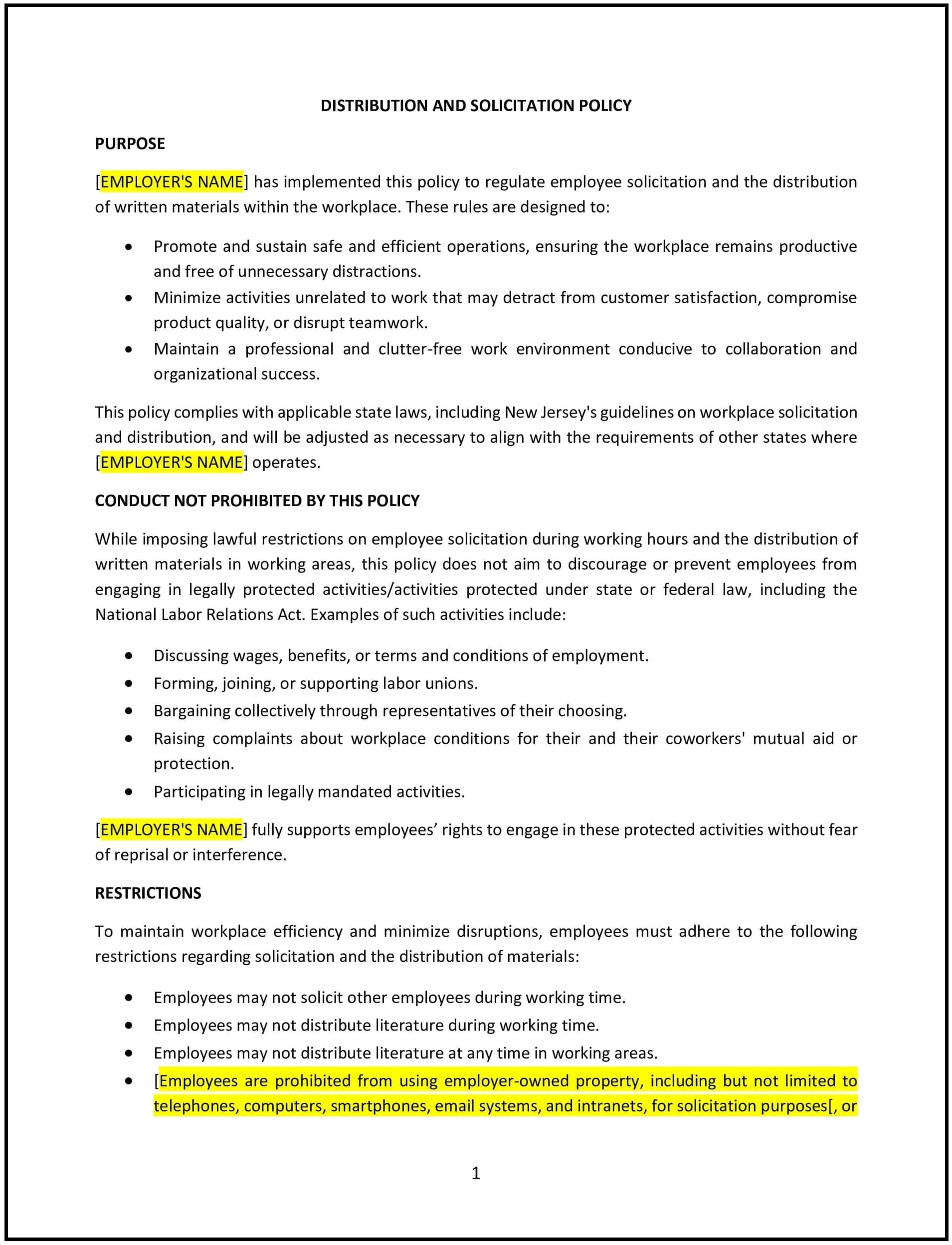Distribution and solicitation (New Jersey) policy: Free template
Got contracts to review? While you're here for policies, let Cobrief make contract review effortless—start your free review now.

Customize this template for free
Distribution and solicitation (New Jersey)
A distribution and solicitation policy helps New Jersey businesses regulate the distribution of materials and solicitation activities within the workplace. This policy outlines when and where employees and external parties may distribute materials, promote causes, or solicit funds. It also sets expectations for maintaining a professional and productive work environment while allowing appropriate activities in designated circumstances.
By adopting this policy, businesses in New Jersey can minimize disruptions, prevent conflicts of interest, and maintain workplace efficiency.
How to use this distribution and solicitation policy (New Jersey)
- Define solicitation and distribution: Specify what constitutes solicitation (e.g., fundraising, selling goods, promoting causes) and distribution (e.g., handing out flyers, petitions, or promotional materials).
- Establish permitted and restricted areas: Identify where solicitation and distribution may take place, such as break rooms or designated common areas, and prohibit such activities in workspaces.
- Outline employee guidelines: Clarify when employees may engage in solicitation or distribution, such as during non-working hours or lunch breaks, and prohibit disruptions to business operations.
- Address non-employee solicitation: Prohibit outside vendors, organizations, or individuals from soliciting employees or distributing materials on company premises without prior approval.
- Set expectations for charitable activities: Provide guidelines on how company-approved fundraising or charitable efforts may be conducted in the workplace.
- Explain the process for requesting approval: Require employees or external groups to seek approval from management before conducting solicitation or distribution activities.
- Detail consequences for violations: Explain that unauthorized solicitation or distribution may result in corrective action, including removal of materials or disciplinary measures if necessary.
- Review and update: Regularly assess the policy to reflect changes in workplace needs, industry standards, and New Jersey labor laws.
Benefits of using this distribution and solicitation policy (New Jersey)
This policy provides several benefits for New Jersey businesses:
- Maintains workplace productivity: Prevents disruptions by regulating when and where solicitation and distribution occur.
- Reduces potential conflicts: Establishes clear rules to prevent pressure, harassment, or inappropriate solicitation in the workplace.
- Protects company interests: Prevents unauthorized individuals or organizations from engaging in commercial or political activities on business property.
- Encourages orderly charitable initiatives: Provides a structured process for supporting approved workplace fundraising and social causes.
- Standardizes enforcement: Ensures consistent application of rules across all employees and locations.
Tips for using this distribution and solicitation policy (New Jersey)
- Communicate the policy clearly: Ensure employees understand the policy by including it in onboarding materials and employee handbooks.
- Establish approval procedures: Designate a point of contact for reviewing and authorizing workplace solicitation requests.
- Monitor workplace activities: Encourage managers to oversee solicitation efforts to ensure they align with company policies.
- Support company-approved initiatives: Provide opportunities for employees to participate in charitable or social causes within designated guidelines.
- Review the policy regularly: Update the policy as needed to reflect workplace changes and New Jersey regulations.